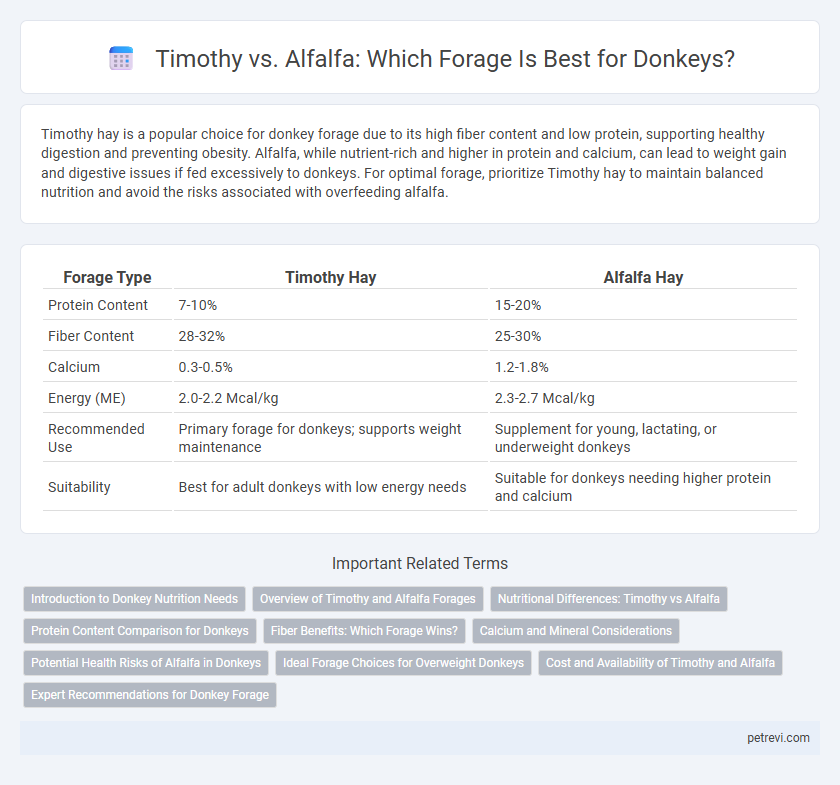Timothy hay is a popular choice for donkey forage due to its high fiber content and low protein, supporting healthy digestion and preventing obesity. Alfalfa, while nutrient-rich and higher in protein and calcium, can lead to weight gain and digestive issues if fed excessively to donkeys. For optimal forage, prioritize Timothy hay to maintain balanced nutrition and avoid the risks associated with overfeeding alfalfa.
Table of Comparison
| Forage Type | Timothy Hay | Alfalfa Hay |
|---|---|---|
| Protein Content | 7-10% | 15-20% |
| Fiber Content | 28-32% | 25-30% |
| Calcium | 0.3-0.5% | 1.2-1.8% |
| Energy (ME) | 2.0-2.2 Mcal/kg | 2.3-2.7 Mcal/kg |
| Recommended Use | Primary forage for donkeys; supports weight maintenance | Supplement for young, lactating, or underweight donkeys |
| Suitability | Best for adult donkeys with low energy needs | Suitable for donkeys needing higher protein and calcium |
Introduction to Donkey Nutrition Needs
Donkeys require a diet high in fiber and low in sugar and starch to maintain optimal health and digestion. Timothy hay provides a suitable forage option with moderate fiber content and low non-structural carbohydrates, making it ideal for donkeys prone to metabolic issues. Alfalfa, while rich in protein and calcium, can be too nutrient-dense and may contribute to obesity or laminitis if fed in excess.
Overview of Timothy and Alfalfa Forages
Timothy and alfalfa are two common forages used in donkey diets, each offering distinct nutritional profiles. Timothy hay is a cool-season grass high in fiber and low in protein, ideal for maintaining healthy digestion and weight management in donkeys. Alfalfa, a legume, provides higher protein, calcium, and energy content, supporting growth and lactation but requiring careful portion control to prevent obesity or digestive upset.
Nutritional Differences: Timothy vs Alfalfa
Timothy hay offers lower protein and calcium levels, making it ideal for donkeys prone to obesity and kidney issues. Alfalfa provides higher protein, calcium, and energy content, supporting donkeys requiring additional nutrients or in recovery. Balancing forage with Timothy hay reduces the risk of laminitis, while Alfalfa is suited for growing, pregnant, or lactating donkeys needing richer nutrition.
Protein Content Comparison for Donkeys
Timothy and alfalfa are popular forage options for donkeys, with alfalfa generally containing higher protein levels, averaging around 15-20%, compared to timothy's 8-12%. Donkeys require lower protein diets to prevent obesity and metabolic issues, making timothy a more suitable forage for mature donkeys. Choosing timothy over alfalfa supports the maintenance of optimal donkey health by providing adequate fiber with moderate protein content.
Fiber Benefits: Which Forage Wins?
Timothy hay offers high fiber content essential for donkey digestive health, maintaining proper gut motility and preventing colic. Alfalfa, although rich in protein and calcium, has lower fiber levels that may increase the risk of obesity and digestive upset in donkeys. For optimal fiber benefits and sustained donkey forage, Timothy hay is the superior choice.
Calcium and Mineral Considerations
Timothy hay provides moderate calcium levels essential for donkey bone health, but its mineral content is relatively low compared to alfalfa. Alfalfa offers higher calcium and essential minerals, supporting stronger skeletal development and preventing deficiencies in donkeys with greater mineral demands. Balancing calcium intake with adequate phosphorus and trace minerals from alfalfa can optimize overall donkey forage nutrition while minimizing the risk of imbalances.
Potential Health Risks of Alfalfa in Donkeys
Alfalfa forage contains high levels of protein, calcium, and calories, which can lead to obesity, hypercalcemia, and digestive upset in donkeys prone to metabolic disorders. Timothy hay provides a lower-calorie, high-fiber alternative that aligns better with the donkey's natural grazing habits and supports optimal gut health. Feeding alfalfa regularly increases the risk of laminitis and kidney strain due to excess nutrient intake in donkeys.
Ideal Forage Choices for Overweight Donkeys
Timothy hay offers a lower calorie and higher fiber option compared to alfalfa, making it ideal for overweight donkeys requiring controlled energy intake. Alfalfa is nutrient-dense and higher in protein, which can contribute to weight gain if not carefully managed. Selecting timothy as the primary forage supports weight management while ensuring adequate nutrition for donkeys needing reduced caloric intake.
Cost and Availability of Timothy and Alfalfa
Timothy and alfalfa are common forage options for donkeys, with timothy generally offering a lower cost and wider availability in many regions due to its adaptability to cooler climates. Alfalfa tends to be more nutrient-dense but often comes at a higher price and may be less available depending on local agricultural practices. Choosing between timothy and alfalfa for donkey feed should consider both the forage cost and regional availability to ensure sustainable and affordable nutrition.
Expert Recommendations for Donkey Forage
Expert recommendations for donkey forage highlight Timothy hay as a preferred choice due to its high fiber content and low sugar levels, which support healthy digestion in donkeys. Alfalfa, while nutrient-rich, contains higher protein and calcium levels that can contribute to obesity and metabolic issues if fed excessively. Feeding primarily Timothy hay with controlled supplementary alfalfa is advised to balance nutritional needs and prevent health complications in donkeys.
Timothy vs Alfalfa for Donkey Forage Infographic

 petrevi.com
petrevi.com